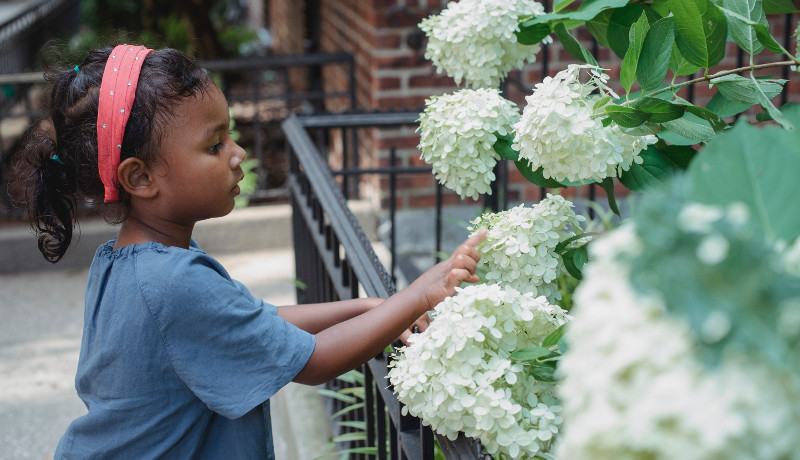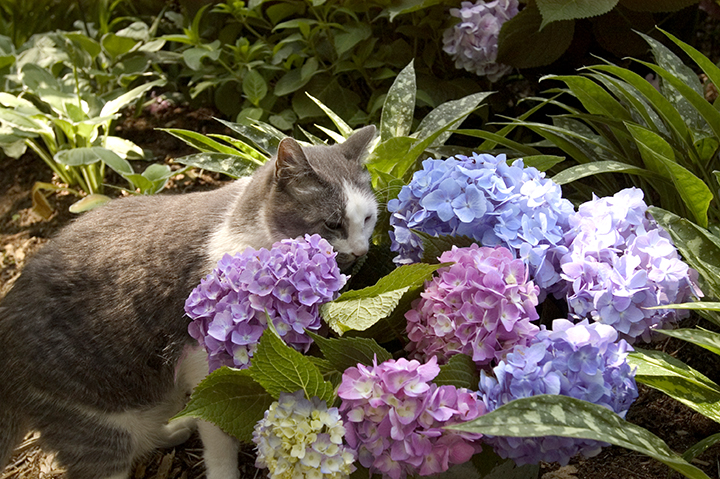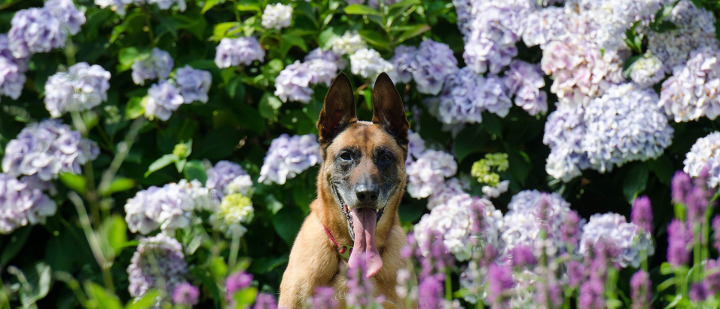Last Updated October 14th, 2021
Although rarely fatal, hydrangeas can be poisonous. Whether you have small children with 2 legs or 4 legs we always worry about them ingesting things that might make them sick. With children we worry about small toys, medications and other items such as plants. With our furry 4 legged children we worry more about them eating our plants because they are curious creatures and while there are many plants that aren’t poisonous to them, there are just as many that can cause serious illnesses or unfortunately death.

Hydrangeas are not edible and are poisonous to cats, dogs and horses. All parts of the plant are poisonous because they contain cyanogenic glycoside. Some of the clinical signs you will include diarrhea, vomiting, and or depression. Cyanide intoxication is usually rare but can cause more stomach issues although you should always seek the advice of a veterinarian immediately, even if they are not showing any signs of being ill.
Are Hydrangeas Poisonous to Cats?
Hydrangeas are poisonous to cats but not fatal in most cases if handled properly. It is best to contact your veterinarian to seek their guidance. Cats are a particular worry since they love to chew plants. They are by nature curious animals that are enticed by the wind blowing the leaves or flowers or the scent of a plant, not just their flowers. I have a cat that loves to rub her cheeks on the points of plants such as a Snake plant but give her a soft leaf or flowers and she is licking her chops at the new salad bar.

Hydrangea Poisoning Symptoms - Cats
- Vomiting
- Diarrhea
- Nausea
- Pain in Abdominal the Region
- Breathing Difficulties
- Depression
- Extremities Stiffness
- Seizures
- Coma
Are Hydrangeas Poisonous to Dogs?
Yes Hydrangeas are poisonous to dogs but not fatal in most cases if handled properly. It is best to contact your veterinarian to seek their guidance. Some dogs are chewers especially puppies. Your slippers aren’t the only thing they will chew until it is unrecognizable. They will chew chair legs, the baby’s favorite blanket, purses, toilet paper, rugs and the list goes on.
Outside they are likely to chew plants or pick up sticks and chew on them as well. To prevent the hydrangeas and other favorite plants from being the new object of your pets chewing affection, here are some products available to homeowners that give plants a bad taste and teach them not to eat the plants:

Hydrangea Poisoning Symptoms - Dogs
- Vomiting
- Diarrhea
- Nausea
- Fatigue
- Loss of Appetite
- Depression
- Heighten Body Temp
- Heighten Heart Rate
So should you grow hydrangeas? ABSOLUTELY!!! With some precautions your plants and your pets should be perfectly safe.
Check with your veterinarian for recommendations. You can also use physical barriers such as decorative fencing to prevent Fido from getting too close for a taste. Dogs and cats can sometimes suffer from a nutrient deficiency if they continually gnaw on certain things so it might be time for a thorough check up from your vet to check on your pets health.
Are Dried Hydrangeas Poisonous?
So you have dried hydrangeas in the home such as a flower arrangement or a wreath? They are just as poisonous as the fresh leaves and flowers! Dried hydrangeas have concentrated forms or cyanogenic glycoside. To add the danger, commercially dried hydrangeas are actually preserved with glycerine or other chemicals that are more dangerous to the animals.
Pet Poison Helpline
If something were to happen to your furry friend, and you suspect that they are suffering from hydrangea poisoning, there is a poison control hotline to call for 24/7 vet advice. It is called Pet Poison Hotline, and their phone number is (855) 764-7661.
Click here for a complete list of Pet Safe Plants.
Sources: "Hydrangea." Queensland Poisons Information Centre. poisonsinfo.health.qld.gov.au
 |
Author Denise Schreiber - Published 6-15-2019 |


